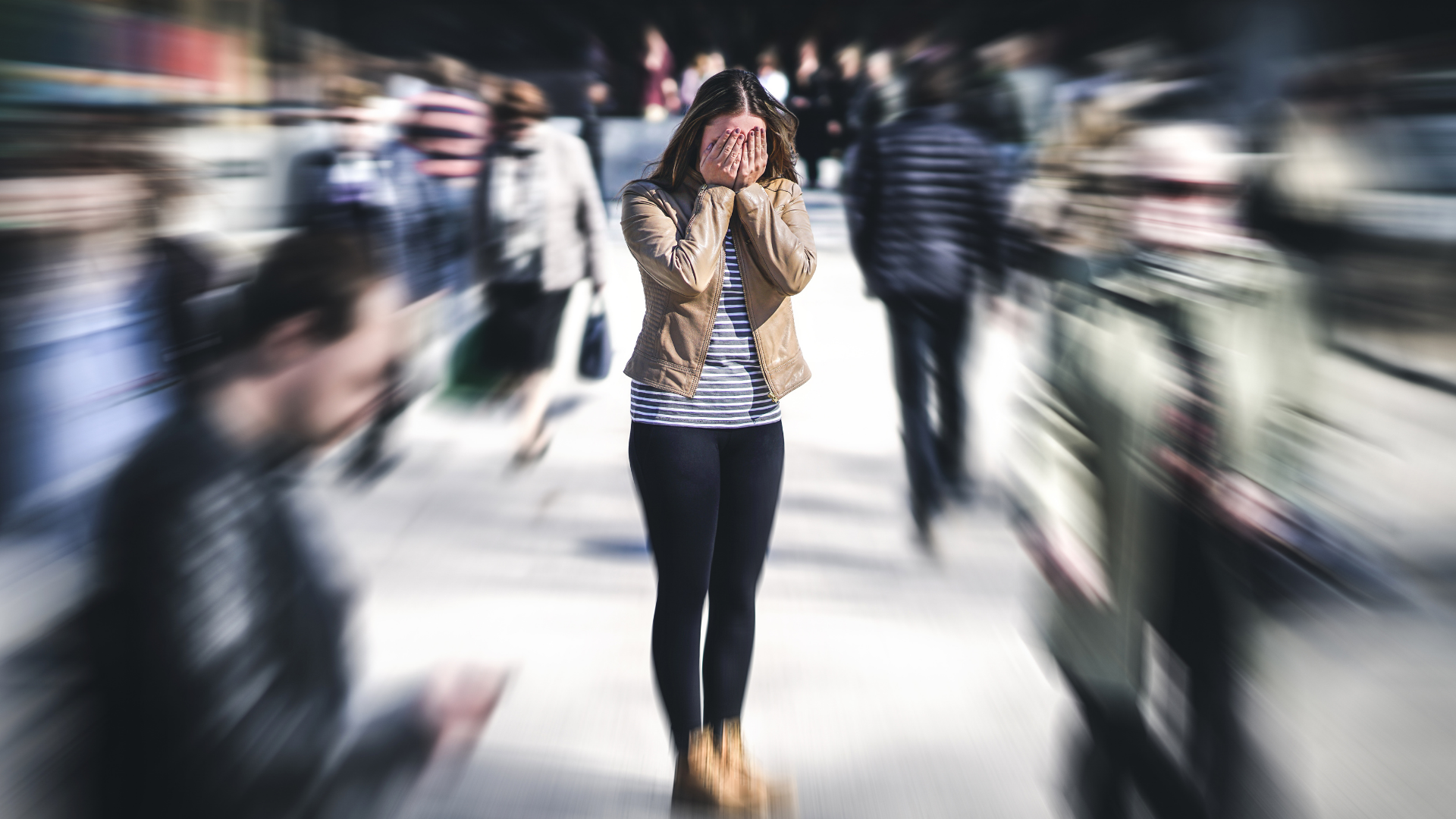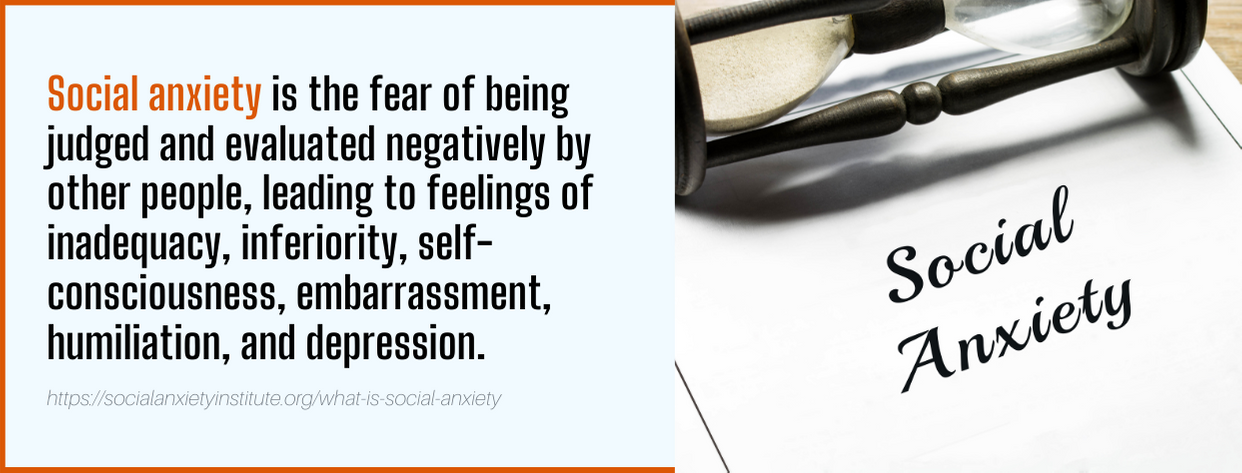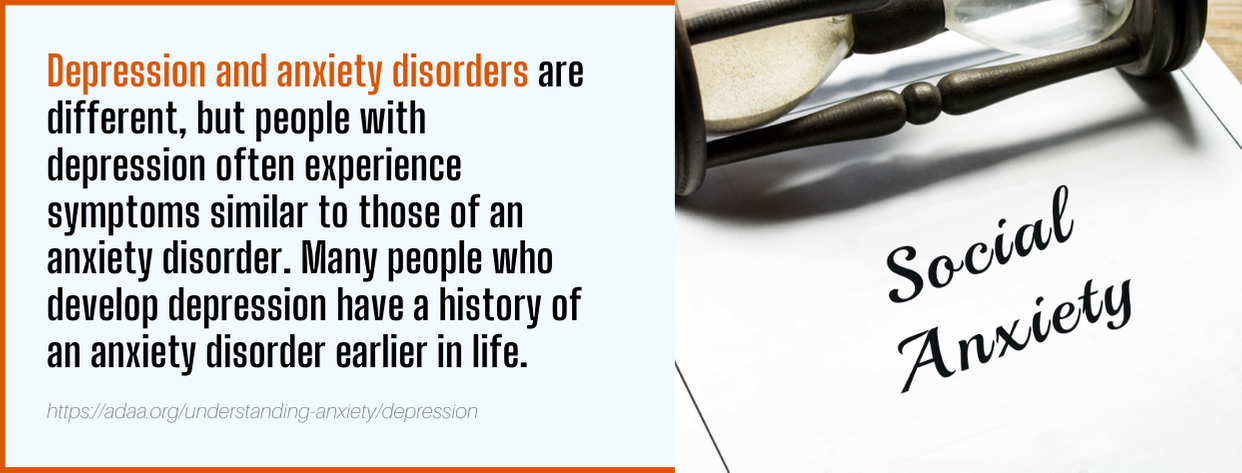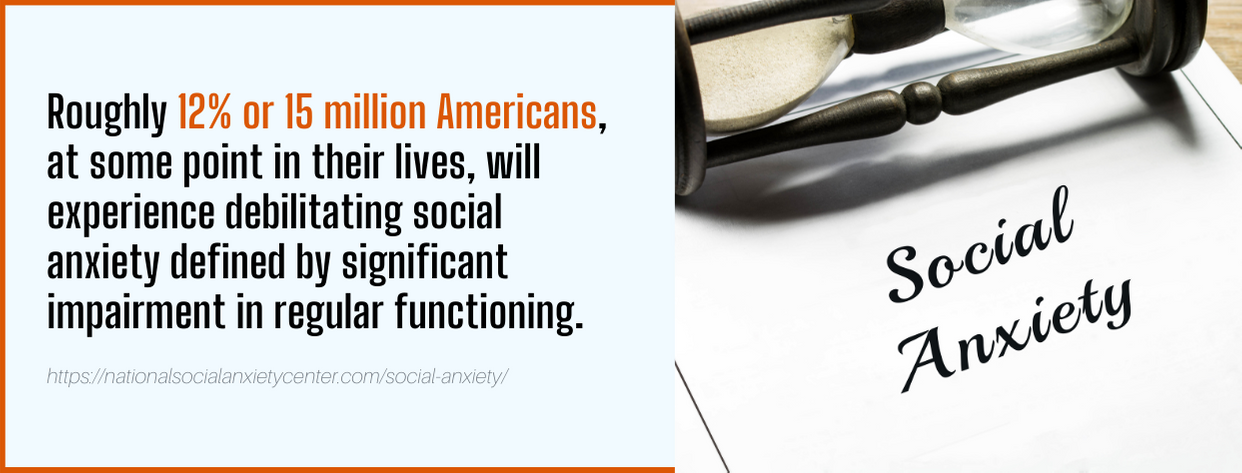Find Your Perfect School
College students today suffer from anxiety disorders. If left untreated, it will be a very persistent illness that can develop into a range of comorbidities. Some college students acquire more severe anxiety disorders, such as affective disorders, nicotine addiction, and drug abuse disorders, indicating a poorer prognosis for treatment.
The majority of college students with SAD have experienced at least significant impairment at some point in their lives. Patients with SAD often have problems with education, family, romantic connections, social networks, quality of life, and other aspects of their lives. Unfortunately, despite being the third most common mental condition among college students, SAD is frequently misdiagnosed and under-treated! Furthermore, clinicians and researchers have paid little attention to it.
Let’s explore Social Anxiety Disorder. Use these page jumps for a convenient read:
- Understanding SAD
- How Social Anxiety Disorder Affects College Students
- Facts and Myths About Social Anxiety Disorder
- Coping With SAD in College
- Getting Help
- Groups and Organizations Offering SAD Support
- Social Anxiety Online Forums and Social Media
- Anxiety Hotlines
- Wrapping Up
Most people feel nervous in social situations, like talking with other people, attending college, or even eye contact.
Most of us have endless thoughts and worries about what we say, how we act, and even what we wear. We feel so anxious about giving speeches or presentations. However, these events often become bearable with experience.
Social anxiety is not just plain shyness but an intense feeling of fear and doubt. For example, in school, you feel terrified whenever your professor calls your name. When asked, even though you know the answer, you refrain from answering.
People with SAD have great fears in social circumstances that they think they cannot control. It is frightening and often disabling. As a result, the everyday life of the student is affected. This mental illness limits your every move. If you feel this way, that is okay.
In fact, according to the latest 2018 research by the American College Health Association (ACHA), more than 63 percent of college students experience excessive anxiety, including social anxiety. Several universities report a growth in the number of college students looking for counseling to ease social anxiety.
Why do college students develop social anxiety? Here are the most common reasons:
New and unfamiliar environment.
Genes are proven to be passed along by parents with social anxiety to children, but moving to a new location is also a factor. You are new to the environment, seeing new faces and circumstances. It can be so stressful, especially for someone who already has anxiety back home.
You are going through simultaneous changes in your life. You have a new schedule and heavier school work, and instead of family, you have a stranger as a roommate. You encounter people with different cultures and points of view.
Social anxiety comes in whenever you are starting to meet new friends, or figuring out whether you will have a circle or not. Most often, college students build a new identity different from who they are at home. And since you are now living by yourself, probably at your college dorm, you feel so anxious dealing with adult responsibilities.
Understandably, you feel more socially anxious, especially if you came to college feeling inadequate or unprepared. After all, college is a big transition in your life – you are now officially an adult!
To make matters worse, the pressure to succeed in college is high, as well as more competition.
When international students choose to continue their studies in another country, they often experience isolation and culture shock. This shock produces psychological crises such as anxiety. The distance between them and their families, the difficulty of learning a new language and communicating with others, and the difficulty of adapting to a new culture, create social anxiety.
You may feel nervous when thinking about approaching students from different cultures. You are afraid that they might not like how you act around them because you have different views.
Separation from family and friends as a source of support.
Even the most self-assured high school kid is likely to lose confidence after leaving home and entering a new setting full of unknown challenges. Familiar individuals are no longer around to reinforce your identity. You may become disoriented and lose your sense of self as a result of this.
Adjusting to college life without their customary support system, along with intense loneliness and homesickness, becomes incredibly challenging. Experiencing this raises the risk of developing social anxiety.
Lack of sleep and concern about the future.
Several studies have demonstrated the benefits of getting enough sleep regularly to reduce anxiety symptoms. However, college life, with its all-nighters, excessive coffee consumption, and parties, can make it hard to maintain correct sleeping habits. Students who lack sleep have higher chances of developing social anxiety.
Social anxiety thrives in the unknown, and college students, unfortunately, have a lot of it. Some of you may have no idea if you will be able to find work after graduation, how you will pay off your student loans, or where you will reside. These reasons often result in being so focused on your studies and your goals rather than your social life.
Some college students are still unsure of their chosen path, which can be especially frightening when their peers appear to have found their calling. One of the top sources of anxiety for many students is the concern of failing to make the transition to adulthood. It may develop into social anxiety where you no longer know how to act around people because you feel like a failure.
In most higher education institutions, curriculum challenges can also contribute to the social anxiety of a student. Some students struggle to answer questions in class, complete tasks and write research papers or reports because they do not understand the subject. As a result, their self-esteem plummets with each passing day, generating social anxiety.
Some students may be hesitant to seek assistance from instructors, and as a result, they become concerned with completing the course requirements. Mathematics, biology, statistics, chemistry, physics, history, and law are just a few of the challenging subjects. Additionally, numerous medical specialty classes, such as dental and medical, medical and engineering, dentistry and veterinary medicine, and pharmacy, cause students to worry.
In preparation for, or when expected to be in, a social or performance-based environment, students often experience several physical symptoms or complaints about feeling ill. Furthermore, these students may freeze or cling to their belongings. These students refuse to participate in numerous activities or attend school, either by refusing to go or refusing to talk even if others force them.
New UK-based research also indicated that looking at the impact of social anxiety in higher education, it is estimated that 10% of university students experience the disorder.
Some students had common anxiety in learning circumstances that entailed interacting with classmates and staff, according to a survey of more than 1,500 students. SAD students would not participate in lectures and even skip class to cope with their nervousness. According to the news release, some students would not participate in school lectures that require them to present at any time. Students who suffer from social anxiety may be missing out on learning chances. They create a diversion from attending academic content due to their fears.
The researchers do not believe that college students receive delicate level teaching. However, they do believe that additional support for students with social anxiety should be made available. There should be no further stigmatizing them or making them feel as though their flaws are exposed.
The researchers suggest not singling out students for questioning in lectures or setting assessed presentations in their first term, the researchers propose. A sensitive recognition should also be in place of the humiliation and struggle by students of their desire to achieve something. It would help them recover from their fear of failure.
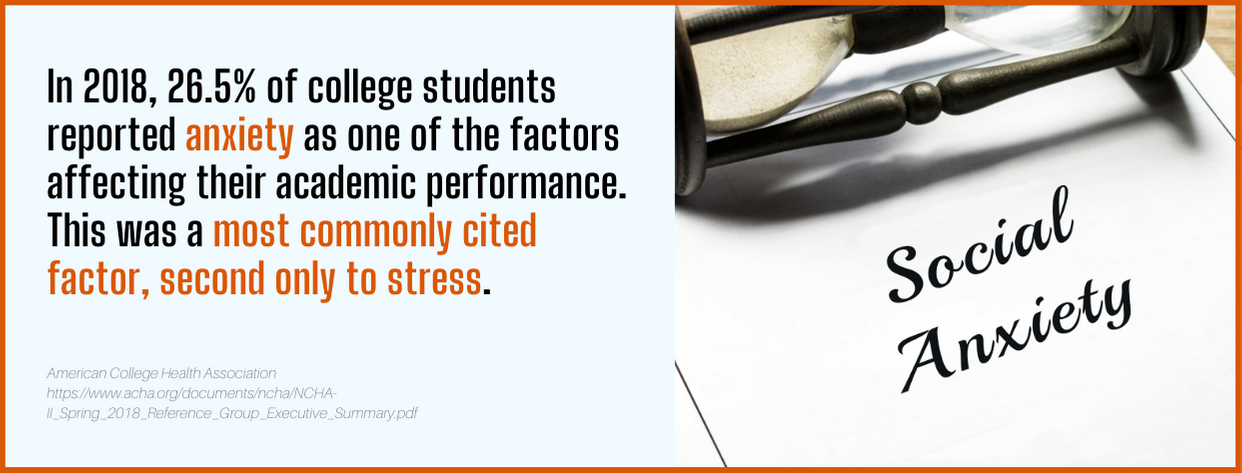
When it comes to social anxiety, many myths are circulating. To no surprise, most are in contrast with the facts. It’s a known fact that being a college student is tough. You have to act in a certain way that professors and parents deem as the right way.
Some people may not understand the struggles you are going through. Others would say that you are not living in the real world just yet. They would often assume that mental struggles are just plain feelings and not illness.
Anxiety is not an illness. You are simply shy.
It is crucial to note that social anxiety is not the same as shyness. Just because someone is shy does not necessarily mean social anxiety. Social anxiety sufferers are not shy at all! However, because shyness can be a sign of social anxiety, it is simple to understand how the two can be confused or linked.
While shyness is a personality attribute, social anxiety is a mental illness that can interfere with daily life. It is not good if a person with SAD is left untreated. It can have a significant negative influence on the personal and professional life of a person.
You should get over it if you try hard enough.
Social anxiety is not something you get over any more than diabetes is something you can get over. This line is not something to say to a person suffering from social anxiety! Social anxiety is a significant condition that, depending on its degree, can be debilitating.
People with SAD may be afraid of specific social circumstances or all social interactions. People with social anxiety suffer daily. Social anxiety can be triggered by eating or drinking in front of others.
A significant symptom of social anxiety is the fear of being embarrassed, rejected, or judged. People with social anxiety panic because they believe they have no control over what others think of them.
They can become so overcome by guilt that it prevents them from going about their usual activities. A SAD sufferer will avoid any circumstance that will result in them being embarrassed.
It’s also impossible to get over performance anxiety, which is related to social anxiety. Increased heartbeat, nausea, stomach distress, and even a rash are all indicators of performance anxiety. You cannot get over it any more than you can get over heart disease.
Social anxiety is nothing more than a pretext to avoid certain situations.
Some people mislead others. They are perfectly capable of dealing with several situations. But they choose to make others believe they are socially nervous.
These are, however, the exceptions. People with social anxiety frequently avoid situations, but this is not due to laziness or ignorance. They are apprehensive because of their great fear of social contact.
Social anxiety will go away on its own
Anxiety is a frequently severe mental health disease that, if left untreated, tends to worsen. Remember that anxiety doesn’t go away on its own! Those who ignore this condition are more prone to use drugs or alcohol to cope.
Although mental health professionals sometimes prescribe drugs to alleviate anxiety, they only provide a band-aid solution. They do not treat the underlying source of the problem.
Social Anxiety Is Just a Phase
36% of SAD sufferers report experiencing symptoms for a decade or more before seeking help, beating the delicate puberty stage, which takes up to six years only, says The Anxiety and Depression Association of America (ADAA).
SAD makes individuals feel less confident and shy, but it is not a phase. It might start with just a few symptoms. But in time, things can get worse unless you seek professional help.
Introverted, quiet persons are the only ones who suffer from social anxiety.
Some people with social anxiety also work as public figures. They are in front of people all the time, either teaching, preaching, or entertaining them.
Social anxiety can be perplexing for extrovert folks. SAD makes interacting with people a real challenge. However, it does not mean they dislike it or refuse to engage.
Anxiety sufferers should stay away from stressful circumstances.
That is, first and foremost, impossible. Second, seeing yourself as vulnerable simply adds to your anxiousness. Remember that you can feel anxious while getting things done.
Avoiding stress may appear to be the best method to alleviate social anxiety, but it is not as simple as you think.
Life is full of stressful and unexpected turns. But that’s not to say everything will cause the general anxiety disorder. Furthermore, adopting a pattern of avoiding things that you know cause anxiety only exacerbates the anxiety disorder.
Worry treatment usually entails progressively and securely exposing you to the source of your anxiety. It will allow you to learn and cope with it rather than avoid it.
It is vital to understand that social anxiety has components: ideas, feelings or emotions, and behaviors. These are linked and mutually beneficial:
For instance, you do not want to go to the dorm meet-and-greet because you are nervous. You feel you cannot make friends because of your social anxiety. You cannot introduce yourself to your roommate because you are anxious and worry too much.
Preparation is the key at all times. We miss out on the opportunity to put our anxiety-fueled beliefs to the test by avoiding social interactions.
You will continue to feel worried and anxious if you do not challenge those fears. Rather than succumbing to your views and feelings, act under what you want out of your college experience.
Recognize your triggers (and how to deal with them)
Several factors can cause social anxiety. Anxiety disorders, in general, are a spectrum of conditions influenced by a range of factors such as brain chemistry, personality, environment, and life experiences. Any of them can cause anxiety. Although it is impossible to change your brain chemistry, knowing which environmental circumstances trigger social anxiety allows you to plan.
Reduce avoidance rather than anxiety.
As a college student, you will encounter multiple situations with different people, such as group activities or debates. Fear and anxiety are unpleasant feelings for anyone.
However, when you avoid situations as a result of it, worry takes over. No one wants worry taking over your life choices. Attempting seemingly impossible tasks can aid in the transformation of our beliefs. We all remember how terrified we were on the first day of middle school, but it got a lot easier by the end of the year.
Engagements in social situations
If hanging out with new acquaintances makes you feel stuck, setting a time limit is a simple approach to avoid feeling stuck during your hangout. Try to invite some people to have lunch or coffee with you after classes. It gives you a way out if you start to feel uneasy.
If everything goes well, you will feel more at ease the next time you meet. There will be some silent and awkward moments for sure, or you may run out of things to talk about with your new friend.
Before deciding to hang out with classmates, try making a list of all possible subjects you can chat about at the table. List down questions, stories, and whatever you can think about that will be a good conversation starter. You can use all of them as a fallback when things start to get quiet and weird.
You are the only person that can know your triggers and how you can deal with them. The first step is to recognize them and devise techniques that work for you.
Depending on the scenario, you can locate an ally to help you overcome your anxiety. Seek advice from someone who can help you devise a plan of action. Look to your professor, guidance counselor, trusted friend, or close relative. Surely one will make dealing with your concerns more manageable and less frightening.
Do not feel pressured. Dealing with anxiety is much more than buying a prescription. It is about figuring out what your stressors are and how to deal with them head-on.
Establish a hierarchy.
Create a list of the social interactions you need to master and rank them from easy to hard. Before moving on to the hard items on your list, focus on being comfortable with the simple activities. Start by greeting your roommate or dorm neighbors.
Practice, practice, practice.
Unfortunately, it is unlikely that you will get through college without being assigned a significant presentation. You can’t negotiate your way out of the project, and it’s not suggested you attempt. Instead, requesting to practice your presentation with your professor during office hours will help to alleviate some of the stress.
You might even ask if you may rehearse in the room where you will be presenting. If you can practice in place, you can get acquainted with the environment.
You can also run your presentation a few times in front of your friends. If you do not have any friends in your school, you can video call your family or childhood friends. It will help you get into a rhythm and be less apprehensive when it is time for the real thing.
You do not have to allow your fear of raising your hand in class to affect your mark if your class lecture has a participation component. Make it less impromptu to lessen the anxieties of impromptu speaking!
Jot down your thoughts ahead of time. It will help you from freezing while thinking on your feet.
Having social anxiety in college may often lead you to worry about how other students react to your point of view. You can try asking questions rather than responding to one as a way to ease into participation.
Furthermore, you can prepare questions and topics ahead of time depending on the subject for that day. Doing so should alleviate some of the anxiety associated with speaking up.
Visiting your professor early in the semester and expressing your worry regarding your class participation is another way. He or she may suggest some alternate ways to get points or other tactics depending on the class.
Set realistic objectives.
A student who did not have the social life they wanted in high school may see college as a do-over. College is a time to make new relationships and strengthen old ones.
Setting objectives that represent who you are rather than who you wish you were will help you achieve your goals. Someone who prefers soft chat is unlikely to enjoy becoming the life of the party.
Adopt an anti-anxiety lifestyle.
The mind and body are inextricably intertwined. There is mounting evidence that how you treat your body has an impact on your anxiety levels. It can control anxiety symptoms and overall self-confidence.
While lifestyle adjustments alone will not be adequate to overcome social anxiety disorder, they will help you proceed in your treatment. The lifestyle suggestions below will assist you in lowering your overall anxiety levels and preparing for successful therapy.
- Reduce or eliminate caffeine
Stimulants such as coffee, tea, soda, and energy drinks exacerbate anxiety symptoms. Consider eliminating caffeine or limiting your intake to the morning.
- Become more active.
Make physical activity a priority—at least 30 minutes every day. If you despise working out, combine it with something you enjoy. You can go window shopping while doing laps around the mall or dancing to your favorite tunes.
- Increase your intake of omega-3 fatty acids.
Omega-3 fatty acids are best for the brain. It can boost your mood, attitude, and anxiety tolerance.
- Only drink in moderation.
College life will tempt you to go to parties and have drinks. However, some students with social anxieties tend to drink alcohol before even going to the party.
They think that drinking alcohol will help them associate with other people despite their social anxiety. But the truth is, alcohol cannot help. It only increases your chances of experiencing panic attacks during the event.
- Give up smoking.
Nicotine is a stimulant with high potency. Smoking, contrary to popular opinion, causes anxiety to increase rather than decrease. So, stop smoking!
- Get adequate restful sleep.
Without enough sleep, you are prone to anxiety. It will help you keep calm in social situations if you are well-rested.
Keep your friends posted.
College is not only stressful in finding friends but also keeping your old friends in the loop. You probably had to strike a delicate balance between looking after yourself and without alienating your friends. You probably found yourself declining invitations and canceling plans. And your friends may misinterpret if they do not understand what you are going through.
With this in mind, nothing exacerbates social anxiety more than attempting to conceal it. People with social anxiety often resort to not telling anyone about their lives. The opposite is suggested by experts! Talk to someone. Having someone you care about on your side will relieve a huge burden.
Furthermore, inform your friends about your social anxiety triggers. It may prevent them from pulling you into situations that would increase your anxiety.
Examine your current living conditions.
Establishing a home base to unwind is highly crucial for social anxiety-ridden students. Figure out what living scenario is ideal for you.
Living alone may appear to be the natural solution to finding downtime in a hectic world. However, you need to look at others when determining the ideal living scenario.
One place to begin is to assess where you fit on the introversion and shyness spectrums. By the way, contrary to common opinion, they are different.
Your anxiety may appear in different ways and have various implications for seeking comfort, depending on where you fall on each spectrum.
Living in a single room or a quiet dorm or apartment with a few close friends may help you. It might give you a welcome respite from social anxiety on campus.
On the other hand, some people are socially conflicted as well. Although timid, they are on the extroverted end of the introversion scale.
Individuals who are socially conflicted have a strong want to belong in the circle. However, most are unable to do so owing to shyness or nervousness. Living alone could exacerbate rather than alleviate social anxiety among socially confused students.
Choosing a more active living situation where you do not have to go out of your way to socialize will keep you from feeling alone. In the long term, lessens social anxiety.
Become your own most ardent supporter.
Nobody else will watch out for you the way you can watch out for yourself. Learn everything you can about SAD and make smarter decisions.
If you believe it will benefit you, request accommodations at work and school. Assist others in gaining a better understanding of the difficulties you experience. Take a break at a party. No one besides yourself truly understands how it feels to be you.
Join Support Groups
Joining a self-help or support group may be beneficial. Internet chat groups may also help you out. However, you should handle advice over the internet carefully. Keep in mind that Internet acquaintances have seldom met in person.
Talking with a trusted friend or a family member can also help but is not always a suitable substitute for professional help. Before any of that, you should always see your doctor.
You can also try Cognitive Behavioral Therapy (CBT) for an effective therapeutic strategy. Exposure therapy is a type of treatment that involves exposing a person to a simulated environment. Visualization, meditation, mindfulness, support, counseling, and breathing exercises are among the anxiety management/relaxation strategies.
Getting Help
If you have been recently diagnosed with SAD, do not lose hope! This mental disorder is still manageable, and you can still have treatment to ease worries and fears.
It is critical to get a good diagnosis and treatment from medical professionals. Medication or cognitive-behavioral therapy is frequently the initial line of treatment.
Participating in a group has the added benefit of meeting people who are dealing with the same issue. While not everyone will experience the same triggers or symptoms, it is comforting to know that you are not alone.
The group setting also allows you to role-play situations that would be dangerous to face in real life right immediately. This soothing and secure setting is ideal for honing your social skills before putting them to the test.
As a college student, you have access to an on-campus mental health center. These are frequently staffed by therapists, psychologists, or student interns and provide several services, including individual and group therapy. Therapy is usually brief and may be provided for free or at a cost.
However, some colleges or universities do not have mental health clinics. You can find a medical center near your campus or in the neighborhood. Furthermore, you can always request a referral to a mental health specialist.
Groups and Organizations Offering SAD Support
Anxiety and Depression Association of America
Anxiety is prevalent, significant, and treatable, according to the ADAA. The second purpose is to promote scientific progress in understanding the causes of anxiety, depression, and related diseases, as well as therapeutic possibilities.
On its website, ADAA includes a search feature. Fill in the words social anxiety and select your state from the drop-down menu.
Daily Strength is an online support group and forum with many groups in various areas. If you are dealing with social anxiety disorder, there is a support group for you. Start by creating an email account and share your problems or questions.
With around 20,000 members, the anxiety support group is highly active.
National Social Anxiety Center
The National Social Anxiety Center (NSAC) is committed to raising public awareness about this issue and connecting people with a social anxiety disorder to well-trained, specialist doctors.
SMART Recovery is usually for people dealing with substance misuse, but it can also benefit people dealing with anxiety. If you or someone you love or close to you is battling addiction, there is a superb family and friend support group available to them.
SMART Recovery is a science-based foundation. It lets people gain a better understanding of the addictive process as well as how to cope with and overcome it. Don’t dwell on the past or create stories that keep you trapped in a victim mindset. Instead, you will receive tools to help you empower yourself.
You can attend SMART Recovery groups in person or via video meetings online. There are numerous meeting times available throughout the world. It is also completely free!
Do you want to post something in a forum? They also have one of those. SMART is convenient because you can publish whenever you want rather than waiting for meetings.
Association of Behavioral and Cognitive Therapies
A multidisciplinary organization, The Association for Behavioral and Cognitive Therapies works with people from all walks of life. They have a dedication to advancing a scientific approach to the understanding and treatment of human issues.
Meetup presents a way to socialize with people who share your interests and hobbies. Many users have also used it to create virtual support groups.
Remember to spend enough time finding the ideal group for you.
Dedicated to assisting SAD sufferers, The Social Anxiety Institute is a treatment clinic that’s been around for 26 years. Patients from over 35 countries have visited the Social Anxiety Institute for individualized therapy and treatment.
You can find hundreds of anxiety support groups on Facebook. Type “social anxiety” into the search box to locate the Social Anxiety Support Group, which has over 42,000 members, as well as the Social Anxiety & Depression with Compassion group, which has 2,220 members, and everything in between.
There are also online forums, such as healthfulchat.org chat room and Social Anxiety Support forum.
Check these hashtags on social media, such as Twitter.
#socialanxiety
#socialanxietydisorder
#socialanxietyawareness
Anxiety Hotlines
There is nothing more frustrating than experiencing anxiety attacks. If you are feeling out of control, call one of the following hotlines to speak with a certified counselor for free:
- The Anxiety and Depression Association of America (ADAA) is open for assistance 24/7: 240-485-1001
- The National Alliance on Mental Illness (NAMI) Helpline: 1-800-950-NAMI available 10 AM to 6 PM (EST) Monday through Friday
- MentalHelp: 1-866-307-3312 available 24/7
- Disaster Distress Helpline: 1-800-985-5990 open 24/7
- Teen Line: 1-310-855-HOPE or 1-800-TLC-TEEN open 6 PM to 10 PM (PST) for teen-to-teen peer counseling
- National Suicide Prevention Lifeline offers help 24/7: 1-800-273-8255
Message these numbers:
- Disaster Distress Helpline: Text TalkWithUs to 66746
- Crisis Text Line: Text CONNECT to 741741
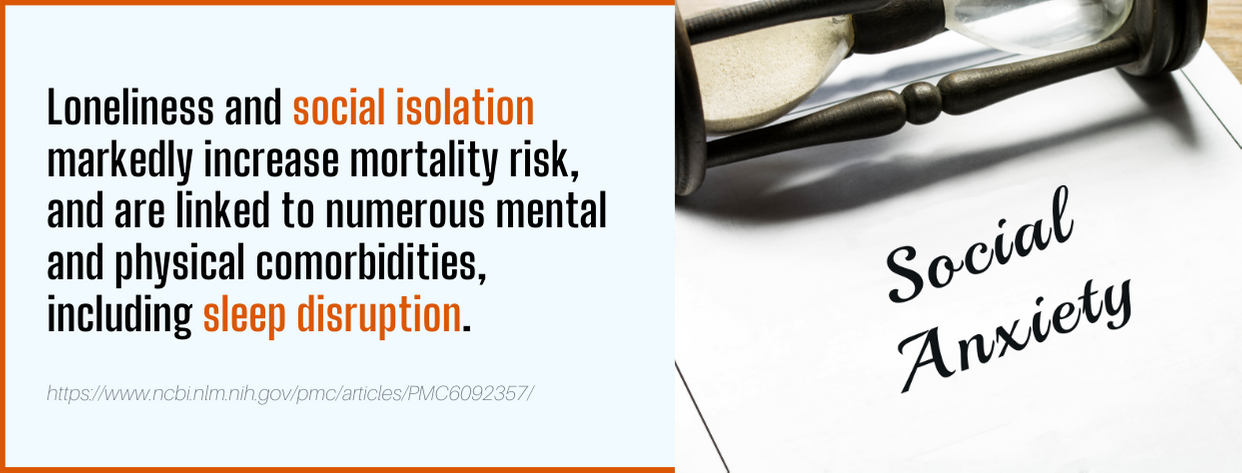
Wrapping Up
It takes time, patience, and perseverance to overcome social anxiety disorder in college! To overcome your social anxieties, you must confront them. Bear in mind that you’re not on your own! Every day, people like you get together to work over their anxieties. Join them by taking a deep breath… consider it the first step in living your most fulfilling life.
Related Resources:
